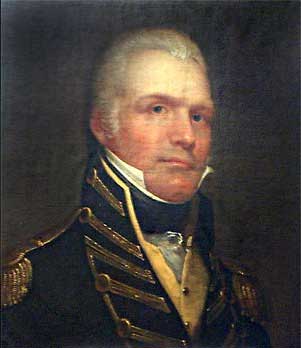Eaton, William
 iv>
iv>
Eaton, William (1764-1811) American Army Officer: Eaton was born in Woodstock, Connecticut, on February 23, 1764. His father, a school-master and farmer, moved to Mansfield around 1774. A few years into the Revolutionary War, young Eaton joined the army at the age of sixteen. When he left the army in 1783, he had reached the rank of sergeant. Graduating from Dartmouth in 1790; he was chosen to be clerk of the House of Delegates in 1791, a position he held until 1797. In 1797, he was appointed consul to Tunis, and arrived there in March of 1799. After several years of negotiations with the Bey of Tunis, he returned to the United States in 1803. Eaton was appointed US Naval Agent to the "Barbary States" (part of North Africa), and accompanied the American fleet to the Mediterranean Sea in the summer of 1804. When he learned that the current pasha of Tripoli, Jussuf Caramalli, had deposed his brother, Hamet, for the throne; Eaton approached Hamet. Leading a force of Arabs, Greeks and Americans, Eaton and Commander Isaac Hull attacked and defeated the town of Bomba. An army from Tripoli descended upon Eaton's troops, leading to several skirmishes over the next few days. When Eaton was ready to march on Tripoli; he learned that Col. Tobias Lear, US Consul-General of Algiers, had negotiated a treaty. One of the terms of the treaty was the payment of $60,000 in ransom for the American captives. Eaton accused Lear of having betrayed American interests in agreeing to the terms of the treaty. Upon his return to the United States, Eaton was praised and honored, but not as much as he had expected. Eaton was also concerned that he had not been compensated for his financial losses in the war. The state of Massachusetts, however, granted him 10,000 acres of land. In addition, in appreciation for his work to release Danish prisoners in North Africa, the King of Denmark presented Eaton with a gold box. In 1806, Aaron Burr tried to convince Eaton to join him in his conspiracy to create a new nation out of Florida and Mexico. Eaton refused, and was a major witness against Burr in his treason trial. After moving to Brimfield, Massachusetts, and representing it in the Legislature, he died on June 1, 1811.
